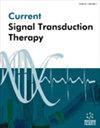An Update on the Pathways and Aspects of Epilepsy Treatment Targets
Q3 Medicine
引用次数: 0
Abstract
Abstract: Epilepsy is a neurological disorder characterized by spontaneously occurring seizures known for several decades. Despite the availability of current anti-epileptic drugs, including Phenytoin, Valproate, Carbamazepine, Lamotrigine, Gabapentin, Vigabatrin, etc., a considerable 30 % of the epileptic population are drug-resistant to the available conventional medications. This suggests a need to find new drug therapy for the management of epilepsy. Moreover, prolonged use of a single drug or monotherapy can also lead to therapeutic failure owing to the inability of a single drug to exert the desired anti-epileptic effect. Hence, on the basis of the knowledge and understanding regarding the existing targets, novel agents having the ability to show therapeutic effects should be studied and investigated further. This article emphasizes the need to investigate and repurpose drug molecules for the management of epilepsy. The review elaborates on the potential targets, including Glutamate, EAAT (Excitatory nucleotide) Channel and mTOR (Mammalian Target of Rapamycin) pathway. Moreover, the discussion on the EAAT (Excitatory Amino Acid Transporters), RAS (Renin Angiotensin System), NHE (Na+/H+ exchangers), HCN (Hyperpolarization- activated cyclic nucleotide) targets and treatment approach has been supported by literature that sheds light on evidence which is validated via suitable preclinical and clinical studies.癫痫治疗靶点的途径和方面的最新进展
摘要:癫痫是一种以自发发作为特征的神经系统疾病,已有几十年的历史。尽管目前有苯妥英、丙戊酸、卡马西平、拉莫三嗪、加巴喷丁、维加巴丁等抗癫痫药物,但仍有相当多的30%的癫痫患者对现有的常规药物具有耐药性。这表明需要寻找治疗癫痫的新药物。此外,长期使用单一药物或单一疗法也可能导致治疗失败,因为单一药物无法发挥预期的抗癫痫作用。因此,在对现有靶点的认识和理解的基础上,应进一步研究和探索具有治疗效果的新型药物。本文强调有必要研究和重新利用药物分子来治疗癫痫。综述详细阐述了潜在的靶点,包括谷氨酸、EAAT(兴奋性核苷酸)通道和mTOR(哺乳动物雷帕霉素靶点)途径。此外,关于EAAT(兴奋性氨基酸转运蛋白)、RAS(肾素血管紧张素系统)、NHE (Na+/H+交换剂)、HCN(超极化激活环核苷酸)靶点和治疗方法的讨论得到了文献的支持,这些文献通过适当的临床前和临床研究证实了这些证据。
本文章由计算机程序翻译,如有差异,请以英文原文为准。
求助全文
约1分钟内获得全文
求助全文
来源期刊
CiteScore
1.70
自引率
0.00%
发文量
18
审稿时长
>12 weeks
期刊介绍:
In recent years a breakthrough has occurred in our understanding of the molecular pathomechanisms of human diseases whereby most of our diseases are related to intra and intercellular communication disorders. The concept of signal transduction therapy has got into the front line of modern drug research, and a multidisciplinary approach is being used to identify and treat signaling disorders.
The journal publishes timely in-depth reviews, research article and drug clinical trial studies in the field of signal transduction therapy. Thematic issues are also published to cover selected areas of signal transduction therapy. Coverage of the field includes genomics, proteomics, medicinal chemistry and the relevant diseases involved in signaling e.g. cancer, neurodegenerative and inflammatory diseases. Current Signal Transduction Therapy is an essential journal for all involved in drug design and discovery.

 求助内容:
求助内容: 应助结果提醒方式:
应助结果提醒方式:


